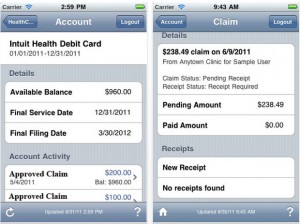Five leading mobile apps for easy healthcare management

Smartphones and tablets have made many tedious aspects of life easier, from simple push alerts and reminders to filing taxes on-the-go.
Another space that is on the way to being revolutionized for the better is personal healthcare management. Don't throw out all of your copies of immunizations and medical bills yet, but these five mobile apps will certainly help cut down on the amount of paper you have to keep around while keeping this information readily (and securely) available to you from anywhere.
Cake Health: The simplest way to describe this one is that it is like Mint for healthcare. If you want to keep going, it could also be said that this app makes healthcare management seem like a piece of cake. (I'll stop now.) Essentially, you can plug in your login information for your healthcare provider, and all of that information should be integrated seamlessly on your Cake Health profile, making it much, much easier to understand your medical bills (and catching errors), knowing the costs of your plan, and tracking the plan in real-time. Cake Health also keeps track of spending habits and even displays some unbeknownst benefits from time to time.
The app is free and available for the iPhone, iPad and iPod touch running iOS 4.0 and higher.
MyMedical: This one has been around for awhile, but it's definitely a good starting point for someone who wants to compile as many pieces of personal medical information into one spot. The trouble here is that you usually have to input all of the data yourself using the web portal, which then emails you a secure link that you must access on the mobile device of your choice for the information to be ported into the app. However, you can input everything related to medical, dental, and optometry visits and more, ranging from glucose levels to programming reminders for when prescriptions are due to expire.
Basically, you can keep track of your own info and anyone in your family who shares that email link with you.
The iPhone/iPod touch version is $1.99, while the iPad version, which tries its best to replicate the analog manila folder look, costs $2.99.
(There's also a comparable app with nearly the same name on Android, but they're quite different in terms of the UI and features available.)
These next three all come from Intuit, which coincidentally is the force behind Mint (with no actual relation to Cake Health). It might seem slanted, but Intuit really is leading some innovative work in this field.

On the mobile side, users can check statements, view claims, and keep their receipts all in one place.
The catch here is that your employer has to provide the physical Intuit Health Debit Card, which is actually only $5 per month per employee and Intuit asserts that there are no set-up fees required. Employees themselves determine how much to put on the debit card each month.
The Health Debit Card app itself is free and available for iOS devices running iOS 3.0 and higher.
Intuit Health iPad Check-In: This app is more for healthcare providers but benefits everyone involved. Instead of filling out a bunch of forms on a clipboard each and every time you visit a doctor, patient registration moves to the iPad. The app keeps track of users, so most of the information can just be saved and reentered automatically each time, saving countless time and energy on an annoying part of the medical visit process.
Additionally, upon completion of filling out the digital form, patients will see exactly how much they owe for that visit, whether it be the whole amount, a co-pay, or nothing depending on their insurance plan -- instead of having a bill pop up in the mail months later when the patient has already forgotten about it and/or doesn't think they should have to pay anything. Thus, miscommunication like that can be avoided.
Intuit Health Mobile Inbox: This basic management app speaks to more than 4.3 million patients already signed up for Intuit Health's patient portal. Intuit Health Mobile Inbox basically opens up the line for communication between doctors and patients on a much easier and flexible level. Patients can make appointments, get lab results, send/receive messages, and pay bills all in one place from anywhere.
These last two apps are both still in development, and deployment is expected to start in 2012. Given that the word "iPad" is included on one product name and both were demoed on iOS devices, it could be safe to say that we'll see those apps on that mobile platform first.
Related:
- SmartPlanet: MyCare: your entire medical history on a smart card
- 5 ways 'bring your own device' will impact your company
- Universities foster the next big tech innovation through open source
- If your medical information is lost or stolen from your doctor, don't expect to hear about it
- Comcast, FCC intro low-cost Internet, digital literacy training for students
- How WellPoint plans to use IBM's Watson